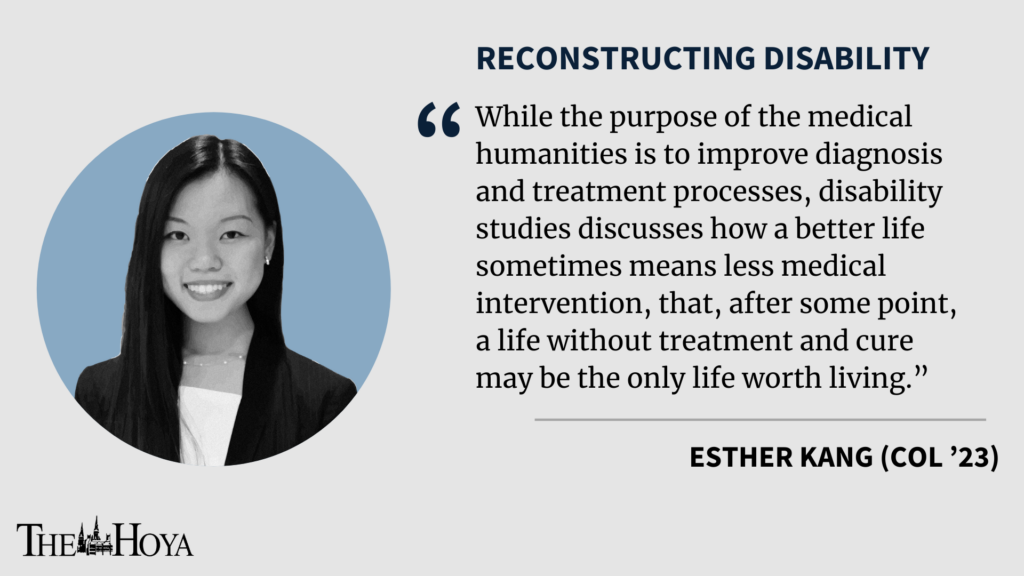Students at Georgetown University hoping to closely read issues of health and medicine under a humanities discipline now have the opportunity to take courses from disability studies or the medical humanities. The existence of both programs may seem redundant to someone outside either area of study, as it isn’t immediately obvious how the two fields differ. After all, both disciplines analyze the politics of embodiment, and both are popular with pre-health students seeking a well-rounded course load.
But this is where most of the similarities end; disability studies and the medical humanities narrate the relationship between people and healthcare institutions from opposite sides of the power dynamic. While medical humanities uses literature as a tool to make the work of diagnosis and treatment more efficient, literature in disability studies serves as a medium to empower the voices of those so often limited to the role of patient.
The differences between the two disciplines begin with their origins. While disability studies emerged out of civil rights activism and a desire for institutional change, doctors and educators developed the medical humanities initiative in the interest of physicians as a supplement to their medical education.
While disability studies acts as a disruptor, medical humanities works to uphold the status quo. Georgetown’s own medical humanities program makes this goal clear in its mission statement.
“Our work aligns with Georgetown University’s core educational mission and Jesuit values, particularly cura personalis; health practitioners cannot treat ‘the whole patient’ without recognizing and valuing their humanity (belief systems, values, cultural differences, etc.),” the Medical Humanities Initiative website reads.
The medical humanities program at Georgetown was designed to teach students to empathize with the other only insofar as doing so enhances clinical procedures. Otherwise, the program might lose financial support from the medical school for merely being interesting but not necessary to the broader practice of medicine. The program may even simply resemble an unfinished version of disability studies with significant gaps, particularly concerning the experiences of those who are beyond the powers of medicine to cure.
Medical humanities is limited to highlighting stories in which medicine has the power to promise a long and healthy life. Medicine delivers on this mission for many people. For people locked into a future of lifelong treatment and/or institutional housing at the behest of a diagnosis, however, the long life medicine promises is not necessarily a desirable one. This dilemma points toward a hope that disability studies regularly revisits, that a future without treatment and cure is not equivalent to no future at all, that such a future may, in fact, be the only way to live freely.
Medical humanities has the best intentions in mind by encouraging clinicians to know what it feels like to be the patient. However, empathy is not enough. It is evident that medical education is not simply lacking a disciplinary balance of STEM and the humanities. The field is also missing a way to teach students how to navigate situations in which medicine fails to be an all-powerful force.
Disability studies criticizes medicine for its ignorance of the boundaries of medicine’s authority. The field shows health care institutions where the boundaries of their authority lie, that longevity does not always ensure a higher quality of life and that parameters of health determined by norms do not directly translate to wellness. While the purpose of the medical humanities is to improve diagnosis and treatment processes, disability studies discusses how a better life sometimes means less medical intervention, that, after some point, a life without treatment and cure may be the only life worth living.
For pre-health students — especially first-years who are still deciding whether and why they should pursue medicine — consider whether there is greater wisdom in knowing the limits of the profession or indulging what is already known. Hippocrates himself expressed concern for future practitioners in the field: “Medicine is of all the Arts the most noble; but, not withstanding, owing to the ignorance of those who practice it, and of those who, inconsiderately, form a judgment of them, it is at present behind all the arts.” Therefore, because disability studies developed outside of medicine and can provide a non-interested critique of the field, pre-health students may gain a more complete and nuanced understanding of the profession from the disability studies program at Georgetown than the medical humanities.
Esther Kang is a sophomore in the College. Reconstructing Disability appears online every other Saturday.









